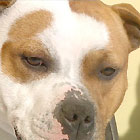Don visited the Animal Eye Care Clinic in East Malvern, Victoria. He talked with specialist veterinary ophthalmologist, Dr Robin Stanley, about the incidence of hereditary eye diseases in dogs. As well as treating these diseases, the clinic performs regular eye certifications of breeding dogs.
Common eye problems
Many popular breeds suffer from eye disorders, such as cataracts, extra eyelashes (which cause eye irritation), entropion (rolling-in of the lower eyelid), tear duct problems and Progressive Retinal Atrophy or PRA (there is no treatment for PRA, so dogs with this condition go blind). Breeds most often examined at the clinic include:
Border Collies (Collie Eye Anomaly – now rarely seen)
Cocker Spaniels (extra eye lashes, cataracts, glaucoma, entropion, PRA, tear duct problems, folded skin over the eyes – often requiring a face lift)
Golden Retrievers (extra eye lashes, entropion, cataracts and now rarely PRA)
Labradors (entropion, star cataracts, PRA, extra eye lashes)
Poodles (cataracts, PRA, glaucoma, extra eye lashes)
Miniature Schnauzers (very severe cases of extra eye lashes, juvenile cataracts)
Staffordshire Bull Terriers (extra eye lashes, entropion)
Dogs (such as Pugs) with short noses, prominent eyes and large eyelid openings tend to ‘pop’ their eyes. A surgery called a ‘corner closure’ has been developed whereby the eyelid corners are narrowed down to fit the size of the cornea.
Breed checks
Breeding dogs undergo a visual eye inspection, which takes about 10 minutes. Should problems be detected, further tests may be conducted. The veterinary surgeon then makes a recommendation as to whether the animal should be used for breeding or not.
Robin strongly recommends that prospective buyers of purebred dogs ask the breeder to produce a current eye certificate. If the breeder is not able to produce a certificate, or denies that the breed is susceptible to heritable eye problems, Robin suggests finding another breeder.
Contact information
Animal Eye Care
Dr Robin Stanley, Dr Chloe Hardman, Dr Anu O’Reilly
181 Darling Road
East Malvern Vic 3145
Phone: (03) 9563 6488
Fax: (03) 9571 9268
Email: [email protected]
Web: www.animaleyecare.com.au



